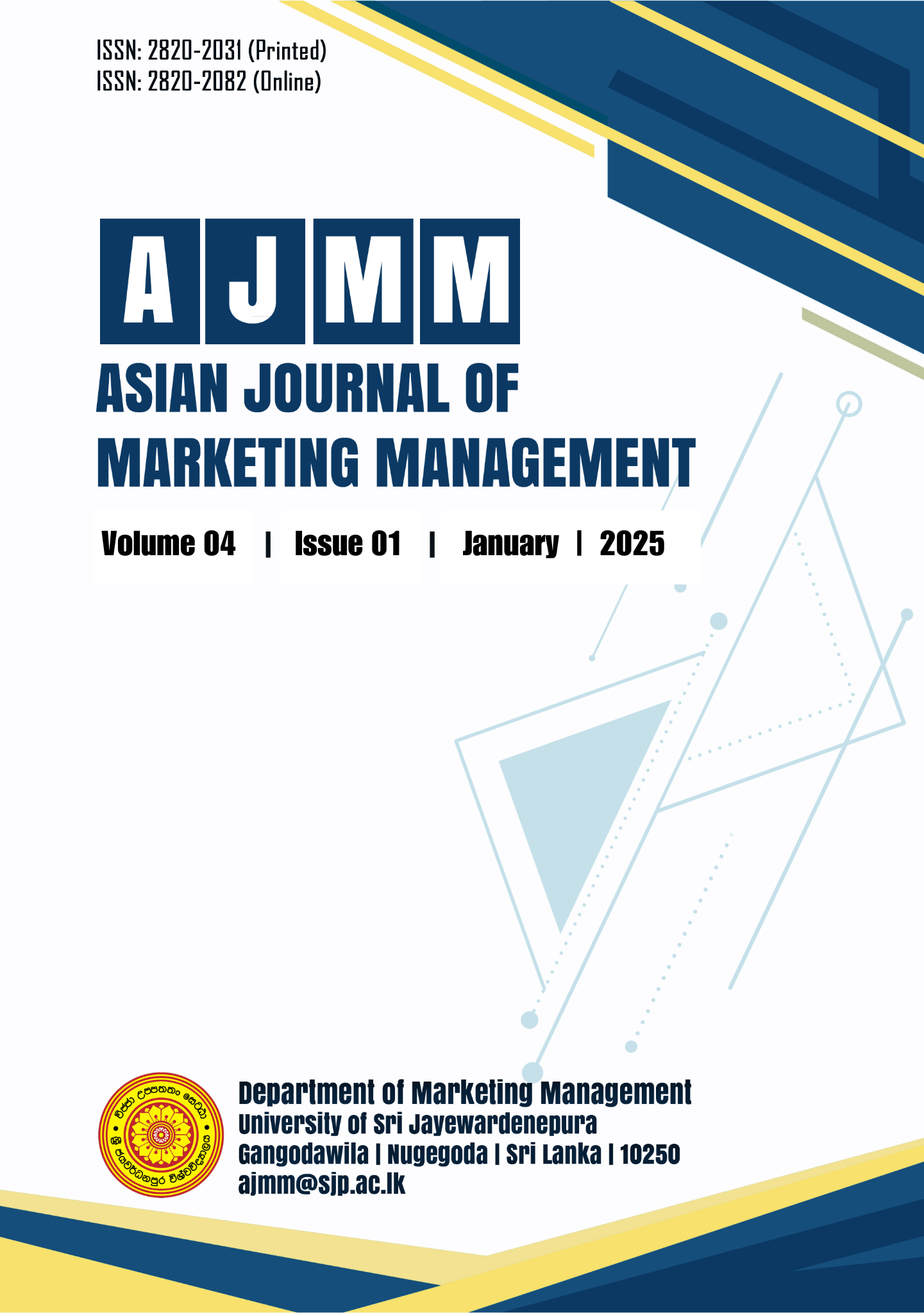Editorial Note
Abstract
The Editorial Board of the Asian Journal of Marketing Management (AJMM), affiliated with the Department of Marketing Management, Faculty of Management Studies and Commerce, University of Sri Jayewardenepura, Sri Lanka, is pleased to present Volume 4, Issue 1 of the journal. This issue reflects the journal’s ongoing commitment to fostering scholarly excellence and addressing the evolving challenges in marketing, consumer behaviour, and digital transformation through theoretically grounded research and empirical insights.
This issue features seven research articles that explore a diverse range of topics, including consumer decision-making, omnichannel integration, digital marketing, social media marketing, sustainability in business transformation, and experiential branding. Collectively, these contributions enhance the understanding of contemporary marketing challenges while providing practical implications for scholars and industry practitioners.
The first article investigates the impact of user-generated content (UGC) on purchase intention among young Sri Lankan consumers in the clothing sector, underpinned by the Uses and Gratifications Theory (UGT). The study finds that different forms of UGC, such as content gratification, social relation gratification, and self-presentation, significantly influence consumer decisions, reinforcing the idea that brands must foster authentic digital engagement to maintain relevance. Future research could extend this framework by incorporating algorithm-driven content personalization and examining how AI-generated recommendations affect trust in UGC.
The second study examines the role of omnichannel integration in fostering positive word-of-mouth (WOM) among supermarket consumers, drawing from Service-Dominant Logic and Consumer Engagement Theory. The study demonstrates that relational integration, transactional coherence, and consistent informational presence enhance consumer advocacy. Given the rapid adoption of AI-driven chatbots and predictive analytics in retail, future studies could explore how automation moderates consumer perceptions of omnichannel service quality.
The third paper examines the impact of immersion on the travel behavioural intentions of Gen Z tourists, highlighting the mediating role of happiness. Grounded in Experience Economy Theory and Positive Psychology, the study emphasizes the importance of deep emotional engagement in wildlife tourism experiences. The findings stress the need for immersive tourism providers to create experiences that promote happiness-driven behavioural intentions. Future directions may include neuroscientific methods for analysing immersive travel experiences, as well as applications in virtual reality (VR) tourism.
The fourth article investigates intelligent transformation in Sri Lankan SMEs, with corporate social responsibility (CSR) as a moderating factor. It positions itself within the Innovation Diffusion Theory. The study finds that external factors such as technological readiness and regulatory support play a more significant role than internal firm characteristics in driving transformation. The discussion calls for policy interventions that encourage responsible AI adoption and sustainable digitalization. Future research may assess the interplay between digital transformation and social impact metrics.
The fifth study investigates experiential marketing strategies in Sri Lanka’s fast-food sector, examining the mediating role of experiential emotional value in revisit intention. Inspired by Experiential Marketing Framework, the study affirms that multi-sensory engagement, emotional resonance, and interactive customer experiences are pivotal in fostering repeat patronage. Given the evolving metaverse-based brand experiences, future research could explore augmented reality (AR) and virtual environments in experiential dining settings.
The sixth article investigates the role of celebrity endorsements in shaping consumer purchase intention in the Sri Lankan hair care industry, analyzing gender as a moderating factor. The findings align with the Source Credibility Model, confirming that trustworthiness, expertise, and attractiveness significantly influence consumer behavior. The study sparks further exploration into cultural variations in celebrity influence.
The final paper assesses the mediating role of perceived authenticity in the relationship between social media influencers (SMIs) and domestic tourist travel decisions in Sri Lanka. Drawing from Source Credibility Theory and Electronic Word-of-Mouth (eWOM) Theory, the study demonstrates that authenticity perception significantly enhances influencer-driven travel choices. This research opens new avenues for examining the risks of deepfake influencers and AI-generated content in digital tourism marketing.
As the marketing discipline continues to evolve in response to technological advancements, shifting consumer expectations, and regulatory transformations, future research should emphasize interdisciplinary approaches that integrate data science, behavioral psychology, and ethical marketing practices. Scholars and practitioners must consider the ethical implications of AI in marketing, the role of digital privacy in consumer trust, and the sustainability of immersive brand experiences.
We extend our deepest gratitude to the authors for their rigorous contributions, as well as to our esteemed reviewers for their invaluable insights, which have strengthened the quality of these publications. Our appreciation also goes to the language editors and the editorial team for their unwavering commitment to ensuring a seamless publication process. We hope this issue inspires further academic exploration and serves as a valuable resource for scholars and marketing practitioners worldwide.





